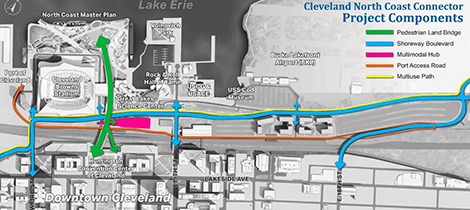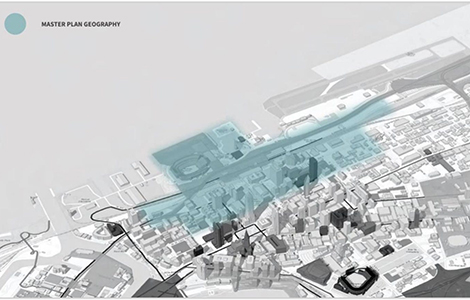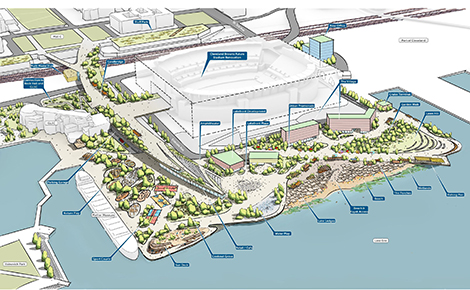Two of Cleveland's Lakefront Grants Survive Federal Scrutiny
by Ken Prendergast, NEOTrans | May. 28, 2025 | 5:30 PM

Ken Prendergast, NEOTrans
The article is published as part of an exclusive content-sharing agreement with neo-trans.blog.
After taking office in January, the Trump Administration began scrutinizing recently awarded federal grants. In response, local, state and federal elected officials from Northeast Ohio scrambled. Their goal was to make sure that federal grants awarded to Greater Cleveland agencies weren’t frozen or, worse, terminated.
Two large, recent grants from the U.S. Department of Transportation (USDOT) totaling $129 million faced such scrutiny and appear to have survived it. Both are intended to help fund the city of Cleveland’s ambitious lakefront masterplan.
One was $69.3 million from the Reconnecting Communities Pilot program and another was $59.7 million Rebuilding America (INFRA) program. The larger grant was awarded with only 10 days remaining in the Biden Administration.
“We are monitoring these awards closely, and to date have yet to hear anything to contradict that they are active,” said a spokesperson for U.S. Rep. Shontel Brown (D-11) of Warrensville Heights.
In a February interview with NEOtrans, Cuyahoga County Executive Chris Ronayne said Brown and other congresspersons plus Ohio’s two senators were working to make sure Ohioans’ tax dollars were reinvested in Ohio. He said the USDOT Reconnecting Communities grant initially was on hold while it and other grants were under review.

The nonprofit organization Transportation For America (T4A) wrote last month that the Reconnecting Communities program, created by the latest five-year infrastructure spending law in 2021, was under threat by Trump and Congress. T4A advocates for multimodal transportation alternatives in addition to roads and bridges.
“It’s an ever-changing situation,” Ronayne told NEOtrans.
While the Reconnecting Communities grant requires a minimum of a 20 percent non-federal funding share to secure it, the INFRA program grant demands a 50/50 match. Combined, at least $77 million in non-federal funds were pledged to secure them. Of that, $20 million is coming from the state’s capital budget.
Much of the remaining match could be provided by the city’s Shore-To-Core-To-Shore tax increment financing (TIF) district that’s expected to generate at least $2.9 billion for public works projects over 30 years in and near downtown.
Philanthropic contributions are also a possibility. A source at the Haslam Sports Group, owners of the Cleveland Browns, told NEOtrans in December and on the condition of anonymity that it was willing to contribute financially to the downtown lakefront plan even as they plan to relocate the Browns to a proposed enclosed stadium in suburban Brook Park.

A preliminary cost of the lakefront plan elements is nearly $450 million, roughly half of which is funded. It has these features:
- Construction of a 120-foot-wide non-vehicular bridge connecting Mall C to the lakefront;
- Partial reassignment of State Route 2 between West 3rd Street and Interstate 90 from limited-access to local-access roadway;
- Reconfiguration of nearly 2 miles of State Route 2 and Port Road relocation;
- Addition of an intersection and roadway for the East 18th Street extension;
- Removal, installation and/or construction of all other improvements including drainage upgrades and utility relocations;
- Installation of curbs, sidewalks, driveways, pedestrian, bicycle and multi-modal paths/trails, traffic and pedestrian signaling, signage, markings and all other appurtenances necessary for completion of the project.

“This funding represents a pivotal step in our mission to reimagine the waterfront and enhance accessibility for all Clevelanders,” said Cleveland Mayor Justin Bibb in a written statement, referring to the two USDOT grants.
Final design work is underway by Osborn Engineering of Cleveland. Construction contractors are to be hired in 2026. Demolition of the existing Shoreway bridge over West 3rd Street and the lakefront railroad tracks and follow-on construction work is scheduled to start in 2027. Construction should take about three years to complete.
“The city of Cleveland’s lakefront master plan is not just another plan on a shelf — it’s an active implementation with over $150 Million of state and federal funding already awarded to start its construction,” said Downtown Cleveland Inc. in a May 20 statement on social media. “The first phases will be underway thanks to this funding.”
The community development organization noted that interim improvements will start this summer. A pop-up park, called North Coast Yard and located on underutilized parking lots north of Huntington Bank Field, will provide new community programming, food and beverage, plus recreation to bring people to the water’s edge before construction of the fully transformed lakefront.
The Greater Cleveland Partnership endorsed the Haslams’ plan for a Brook Park stadium, demolishing the existing lakefront stadium, closing Burke Lakefront Airport and redeveloping both lakefront sites. The city of Cleveland has commissioned a land-use plan from its lakefront consultants for the stadium site if the stadium is demolished but has not released any documents yet.
One of the largest locally awarded federal grants, a $129.4 million award from the U.S. Environmental Protection Agency to Cuyahoga County, initially was frozen but was since released so the county could draw down funds, said Cuyahoga County Communications Director Kelly Woodard.
That grant will construct five solar arrays on closed land fills in four communities, closing a coal-fired power plant in Painesville and supporting reforestation efforts in Greater Cleveland — a community once called the Forest City.
The only federal grant terminated so far was a $1 million EPA Environmental Justice Solar for Schools award. The grant would allow five school districts in Cuyahoga County to tap into these funds to install solar panels to lower energy costs. It was terminated on March 7.
“We are appealing the termination of our Environmental Justice grant,” Woodard said.
Yet another recent federal grant, $7 million for the Veterans Memorial Bridge Connectivity Plan Project, has already been obligated and cannot be terminated. It is funding an alternatives analysis for reopening the long-unused streetcar subway deck of the Veterans Memorial Bridge in Cleveland for bicycle, pedestrian and public realm improvements.
For more updates about Cleveland, sign up for our Cleveland Magazine Daily newsletter, delivered to your inbox six times a week.
Cleveland Magazine is also available in print, publishing 12 times a year with immersive features, helpful guides and beautiful photography and design.

Ken Prendergast, NEOTrans
Ken Prendergast is a local professional journalist who loves and cares about Cleveland, its history and its development. He has worked as a journalist for more than three decades for publications such as NEOtrans, Sun Newspapers, Ohio Passenger Rail News, Passenger Transport, and others. He also provided consulting services to transportation agencies, real estate firms, port authorities and nonprofit organizations. He runs NEOtrans Blog covers the Greater Cleveland region’s economic, development, real estate, construction and transportation news since 2011. His content is published on Cleveland Magazine as part of an exclusive sharing agreement.
Trending
-
1
-
2
-
3
-
4
-
5










